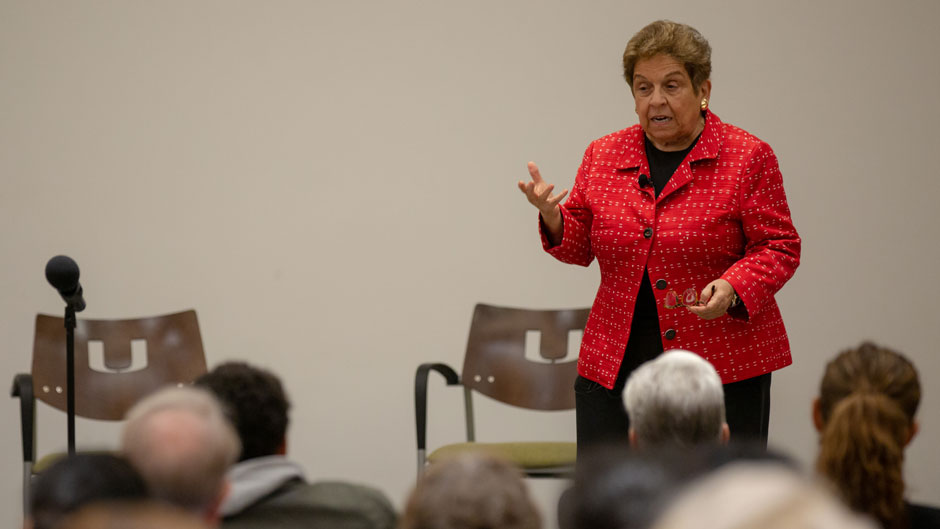Now a junior congresswoman from South Florida, former University of Miami President Donna E. Shalala returned to campus Tuesday to share her agenda for the 116th U.S. Congress—but she began by answering the question she’s so often asked: Why, after such a long and storied career, did she bother running for the seat that longtime U.S. Rep. Ileana Ros-Lehtinen vacated?
“It was the most irrational decision I’ve ever made in my whole life,” Shalala said, explaining that she was motivated by anger at both Democrats and Republicans in Washington who were focused on partisanship, not policy. “They were acting like teenagers in high school as opposed to people who were supposed to be making the country better.”
So, Shalala said, she decided to gamble, a gamble she won with her focus on the issues that mattered most to her and to voters, and her devotion to the lost culture of bipartisanship the Democrat mastered during years of government service, including eight as the nation’s longest-serving secretary of health and human services, and nearly three decades at the helm of three universities, including 14 years at UM.
“I took a chance that voters would see me as someone who would bridge the gap and walk across the aisle and try to build support, bipartisan support, for a number of policies, which is what I did when I was in government,” Shalala told the audience, which included her successor, UM President Julio Frenk.
“Almost every major policy, whether it was doubling the NIH budget, or passing the Children’s Health Insurance Plan, or dealing with immunization, or expanding health care for those with disabilities, or global health, particularly AIDS—all of them had bipartisan support,” she said, recounting her many successes on President Bill Clinton’s cabinet.
The vast experience that Shalala, who now serves on the House Education and Labor and Rules committees, and Frenk, who as Mexico’s minister of health brought health insurance to millions of uninsured Mexicans in his homeland, share did not go unnoticed by Merike Blofield, associate professor of political science and director of Gender and Sexuality Studies, who long ago invited Shalala to speak at UM during Women’s History Month.
“My dream would be to have President Frenk and Congresswoman Shalala bring their expertise together and get a broad political mandate to come up with a solution to America’s health care crisis,” Blofield said in the student center named after Shalala. “In this room, we have the brainpower to come up with solutions, and the biggest obstacles are, unsurprisingly, political.”
Health care, particularly shoring up the Affordable Care Act and closing the gap on universal coverage, was among the top three issues Shalala said she ran on, and remains focused on in Congress.
Noting that Miami has the largest number of people—100,000—enrolled in the Affordable Care Act, Shalala said “shoring it up, and making sure that it survives, as opposed to this repeal and replace that the president wants us to go through again, is extremely important to this community.”
Her other two major issues, Shalala said, are equally important to her and South Florida: immigration and the environment.
Recounting how both sets of her grandparents emigrated to the U.S. from Lebanon, Shalala said her own story resonated with Miami’s ethnically diverse voters because, in a sense, it is their story, too. She noted that her maternal grandmother remained undocumented for decades because, after being turned away from Ellis Island for an eye problem, she slipped into the U.S. from Mexico.
“I believe that people who have been here for a long period of time, including those who are undocumented, we should find a pathway to citizenship for,” Shalala said. “I’m not into legal status. They need a chance to become citizens because they are doing everything citizens do except vote.”
On the environment, Shalala said she supports Everglades restoration, and big, evidenced-based ideas on tackling climate change and sea-level rise. “I am looking for a big bill that takes a giant step because I agree with the proponents of the Green New Deal, with their goals, that we cannot take small steps with the environment. We need to take giant steps,’’ she said. “What that strategy is hasn’t been discussed or translated into much legislation.”
Sara Soto, a senior who transferred to UM from Colombia two years ago, was as intrigued by the invitation to attend Shalala’s talk—which was open to all students—as she was excited to meet the freshly minted congresswoman.
“I had this view that people like that don’t talk to people like us,’’ said Soto, who is majoring in sociology and psychology. “So as soon as I saw the invite, I knew I had to go. I have been hearing about Donna Shalala since I got here and I wanted to see why. Now I know why: She’s aware, she listens, and she’s focused on getting things done.”

